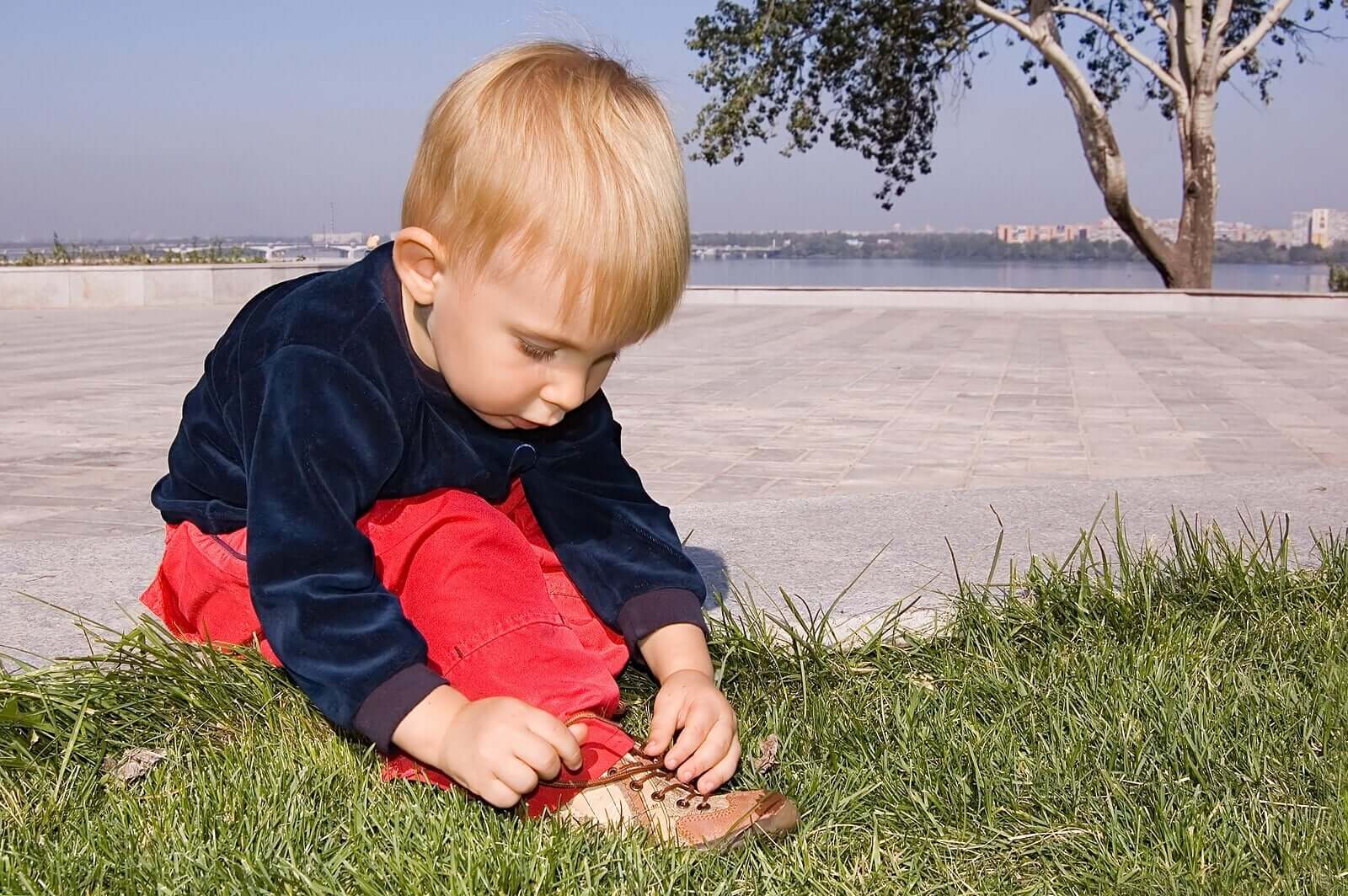Personality Development in Childhood

Personality is a psychological construct that refers to a combination of emotional, cognitive and behavioral characteristics. These steady and long-lasting characteristics define people and differentiate them from others. However, you should know that babies aren’t born with a defined personality. In fact, personality development is progressive and happens through time.
Experiences and affective relationships formed during the first years of life are key elements in personality development. Do you want to know how personality evolves during early childhood? Find out all the stages children go through during this process.
Personality development in childhood
According to Henri Wallon, French Psychologist, there are different stages in personality development during early childhood. Next, we’ll talk about all of them.

Personality development from birth to 3 years old
From the moment babies are born, they start developing their personality. And, eventually, by the time they’re three years old, they acquire the following abilities that relate to the construction of their own identity:
- They identify themselves and differentiate from the rest of the people (inner world and outer world). This way, children begin perceiving themselves as individuals, different from others.
- They become aware of their own actions (what they do) and differentiate other people’s actions (what others do).
- They learn to differentiate what belongs to them and what belongs to others.
From 3 to 6 years old
Between 3 and 6 years old, children go through a personalism stage. This stage is divided into three different periods:
- Period of opposition and inhibition: when they’re 3 years old, they need to reassure their own identity, favoring the development of independence. That’s why they constantly manifest a state of opposition, rejection and negativism towards others, especially their adult role models.
- Period of grace: when they’re 4, children need constant affection and approval. In order to get this, they grab people’s attention with gestures, words and actions. This is a narcissistic phase.
- Imitation period or role playing: between 5 and 6, children try to assimilate, embrace and copy all the characteristics of those who they admire. Normally, they imitate one of their parents, because they identify with them.
What factors affect personality development in childhood?
As we’ve seen before, there are different stages children go through in order to develop their own personality. Furthermore, there are many factors that affect and condition this process.
- Hereditary factors: what they inherit from their parents. This refers to the aspects of the personality that are stable and immutable, and that you can see in little children.
- Environmental factors: the environment in which children grow plays an important role in the development of their personality. They understand the world and respond to it depending on their social and cultural context, as well as on the relationships they form. Among the environmental factors, you’ll find:

- Social and affective experiences: these are all the important events around them. Attachment bonds formed between kids and their primary caretakers define children’s first experiences. Then, as they grow up, children will face social and affective situations that are more complex. For example, they may face the birth of a sibling, start kindergarten, etc.
- Values and beliefs: from an early age, children assimilate and adopt their parent’s values and beliefs. Thus, a series of rules and social standards will define their actions.
“We are all born with a unique genetic blueprint, which lays out the basic characteristics of our personality as well as our physical health and appearance… And yet, we all know that life experiences do change us.”
– Joan D. Vinge –
In conclusion: first years of life are fundamental for personality development.
Personality is a psychological construct that refers to a combination of emotional, cognitive and behavioral characteristics. These steady and long-lasting characteristics define people and differentiate them from others. However, you should know that babies aren’t born with a defined personality. In fact, personality development is progressive and happens through time.
Experiences and affective relationships formed during the first years of life are key elements in personality development. Do you want to know how personality evolves during early childhood? Find out all the stages children go through during this process.
Personality development in childhood
According to Henri Wallon, French Psychologist, there are different stages in personality development during early childhood. Next, we’ll talk about all of them.

Personality development from birth to 3 years old
From the moment babies are born, they start developing their personality. And, eventually, by the time they’re three years old, they acquire the following abilities that relate to the construction of their own identity:
- They identify themselves and differentiate from the rest of the people (inner world and outer world). This way, children begin perceiving themselves as individuals, different from others.
- They become aware of their own actions (what they do) and differentiate other people’s actions (what others do).
- They learn to differentiate what belongs to them and what belongs to others.
From 3 to 6 years old
Between 3 and 6 years old, children go through a personalism stage. This stage is divided into three different periods:
- Period of opposition and inhibition: when they’re 3 years old, they need to reassure their own identity, favoring the development of independence. That’s why they constantly manifest a state of opposition, rejection and negativism towards others, especially their adult role models.
- Period of grace: when they’re 4, children need constant affection and approval. In order to get this, they grab people’s attention with gestures, words and actions. This is a narcissistic phase.
- Imitation period or role playing: between 5 and 6, children try to assimilate, embrace and copy all the characteristics of those who they admire. Normally, they imitate one of their parents, because they identify with them.
What factors affect personality development in childhood?
As we’ve seen before, there are different stages children go through in order to develop their own personality. Furthermore, there are many factors that affect and condition this process.
- Hereditary factors: what they inherit from their parents. This refers to the aspects of the personality that are stable and immutable, and that you can see in little children.
- Environmental factors: the environment in which children grow plays an important role in the development of their personality. They understand the world and respond to it depending on their social and cultural context, as well as on the relationships they form. Among the environmental factors, you’ll find:

- Social and affective experiences: these are all the important events around them. Attachment bonds formed between kids and their primary caretakers define children’s first experiences. Then, as they grow up, children will face social and affective situations that are more complex. For example, they may face the birth of a sibling, start kindergarten, etc.
- Values and beliefs: from an early age, children assimilate and adopt their parent’s values and beliefs. Thus, a series of rules and social standards will define their actions.
“We are all born with a unique genetic blueprint, which lays out the basic characteristics of our personality as well as our physical health and appearance… And yet, we all know that life experiences do change us.”
– Joan D. Vinge –
In conclusion: first years of life are fundamental for personality development.
All cited sources were thoroughly reviewed by our team to ensure their quality, reliability, currency, and validity. The bibliography of this article was considered reliable and of academic or scientific accuracy.
- Carrillo-Siles, B. (2009). La personalidad infantil. Revista digital Innovación y Experiencias Educativas, (15).
- DE, M. D. P. C. M., TORRE, L., EL CASTIGO, D. S. E. P., & DEL NIÑO, M. L. C. ESCUELA DE PADRES I: PREMIOS Y CASTIGOS A LOS NIÑOS. https://archivos.csif.es/archivos/andalucia/ensenanza/revistas/csicsif/revista/pdf/Numero_23/MARIA%20DEL%20PILAR_CALVO_MANZANO_DE%20LA%20TORRE.pdf
- Lacunza, A. B. (2011). Las habilidades sociales y el comportamiento prosocial infantil desde la psicología positiva. Pequén, 1(2), 1-20. http://revistas.ubiobio.cl/index.php/RP/article/view/1831/1775
- Marrero Afonso, E. J. (2019). El papel de la educación en el desarrollo de la personalidad. https://riull.ull.es/xmlui/bitstream/handle/915/16211/El%20papel%20de%20la%20educacion%20en%20el%20desarrollo%20de%20la%20personalidad..pdf?sequence=1&isAllowed=y
-
Martínez, M. D. C. P., Justicia, F. J., & Cabezas, M. F. (2010). Prácticas de crianza y competencia sociales en niños de 3 a 5 años. Pensamiento psicológico, 6(13). http://revistas.javerianacali.edu.co/index.php/pensamientopsicologico/article/download/116/346
- Wallon, H. (1965). Estudios sobre psicología genética de la personalidad. Buenos Aires: Lautaro.
This text is provided for informational purposes only and does not replace consultation with a professional. If in doubt, consult your specialist.








